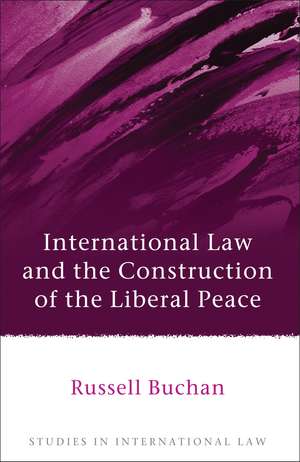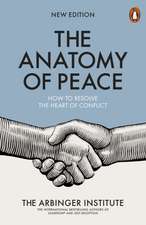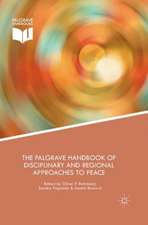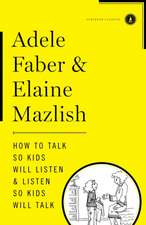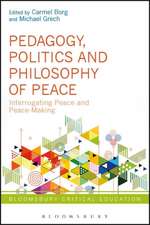International Law and the Construction of the Liberal Peace: Studies in International Law
Autor Dr Russell Buchanen Limba Engleză Hardback – 23 iul 2013
Din seria Studies in International Law
- 30%
 Preț: 598.45 lei
Preț: 598.45 lei - 30%
 Preț: 570.51 lei
Preț: 570.51 lei - 34%
 Preț: 512.30 lei
Preț: 512.30 lei - 34%
 Preț: 511.07 lei
Preț: 511.07 lei - 21%
 Preț: 275.26 lei
Preț: 275.26 lei - 18%
 Preț: 297.20 lei
Preț: 297.20 lei - 23%
 Preț: 249.26 lei
Preț: 249.26 lei - 30%
 Preț: 571.24 lei
Preț: 571.24 lei - 34%
 Preț: 509.52 lei
Preț: 509.52 lei - 30%
 Preț: 573.05 lei
Preț: 573.05 lei - 30%
 Preț: 538.77 lei
Preț: 538.77 lei -
 Preț: 448.39 lei
Preț: 448.39 lei - 30%
 Preț: 571.34 lei
Preț: 571.34 lei - 30%
 Preț: 1138.79 lei
Preț: 1138.79 lei - 28%
 Preț: 406.31 lei
Preț: 406.31 lei - 21%
 Preț: 270.97 lei
Preț: 270.97 lei - 30%
 Preț: 570.43 lei
Preț: 570.43 lei - 30%
 Preț: 836.82 lei
Preț: 836.82 lei - 14%
 Preț: 570.43 lei
Preț: 570.43 lei - 30%
 Preț: 512.37 lei
Preț: 512.37 lei - 30%
 Preț: 954.11 lei
Preț: 954.11 lei - 30%
 Preț: 572.47 lei
Preț: 572.47 lei - 30%
 Preț: 603.73 lei
Preț: 603.73 lei - 30%
 Preț: 779.50 lei
Preț: 779.50 lei - 14%
 Preț: 837.54 lei
Preț: 837.54 lei - 30%
 Preț: 898.78 lei
Preț: 898.78 lei - 30%
 Preț: 576.40 lei
Preț: 576.40 lei - 30%
 Preț: 719.91 lei
Preț: 719.91 lei - 30%
 Preț: 599.66 lei
Preț: 599.66 lei - 12%
 Preț: 233.46 lei
Preț: 233.46 lei - 30%
 Preț: 779.50 lei
Preț: 779.50 lei - 30%
 Preț: 570.43 lei
Preț: 570.43 lei - 14%
 Preț: 779.09 lei
Preț: 779.09 lei - 30%
 Preț: 540.38 lei
Preț: 540.38 lei - 30%
 Preț: 573.86 lei
Preț: 573.86 lei - 30%
 Preț: 542.02 lei
Preț: 542.02 lei - 28%
 Preț: 500.25 lei
Preț: 500.25 lei - 14%
 Preț: 574.92 lei
Preț: 574.92 lei - 30%
 Preț: 540.48 lei
Preț: 540.48 lei - 30%
 Preț: 778.12 lei
Preț: 778.12 lei - 30%
 Preț: 570.43 lei
Preț: 570.43 lei - 30%
 Preț: 515.24 lei
Preț: 515.24 lei - 30%
 Preț: 573.70 lei
Preț: 573.70 lei - 30%
 Preț: 720.23 lei
Preț: 720.23 lei - 30%
 Preț: 784.00 lei
Preț: 784.00 lei - 22%
 Preț: 571.24 lei
Preț: 571.24 lei - 14%
 Preț: 779.09 lei
Preț: 779.09 lei
Preț: 511.14 lei
Preț vechi: 731.63 lei
-30% Nou
Puncte Express: 767
Preț estimativ în valută:
97.82€ • 106.22$ • 82.17£
97.82€ • 106.22$ • 82.17£
Carte tipărită la comandă
Livrare economică 22 aprilie-06 mai
Preluare comenzi: 021 569.72.76
Specificații
ISBN-13: 9781849462440
ISBN-10: 1849462445
Pagini: 258
Dimensiuni: 156 x 234 x 20 mm
Greutate: 0.54 kg
Ediția:New.
Editura: Bloomsbury Publishing
Colecția Hart Publishing
Seria Studies in International Law
Locul publicării:London, United Kingdom
ISBN-10: 1849462445
Pagini: 258
Dimensiuni: 156 x 234 x 20 mm
Greutate: 0.54 kg
Ediția:New.
Editura: Bloomsbury Publishing
Colecția Hart Publishing
Seria Studies in International Law
Locul publicării:London, United Kingdom
Caracteristici
This book argues that since the end of the Cold War an international community of liberal states has crystallised within the broader international society of sovereign states.The book deploys the concepts of the international society and the international community in order to construct an explanatory framework that can enable us to better understand recent changes to the political and legal structure of the world order.A unique and topical study that will be of interest to those working in the fields of International Law and International Relations.
Notă biografică
Russell Buchan is a Lecturer in International Law at the University of Sheffield.
Cuprins
Introduction PART 1 1: The International Society and the International Community 1. Introduction 2. The International Society 3. The International Community 3.1 Liberalism and Legitimate Statehood 3.2 Illegitimacy and the Denial of Sovereignty3.3 Disintegration of the International Community: Iraq 2003 4. Conclusion 2: The Role of International Law in the International Society and the International Community 1. Introduction 2. The International Society and International Law 2.1 The Principle of Non-Intervention 2.2 The Use of Force Prohibition 3. The International Community and International Law 3.1 Adapting Existing Principles of International Law 3.2 The Development of New Legal Rules and Concepts 4. Conclusion 3: The International Community and the Liberal Peace 1. Introduction 2. The Liberal Peace Thesis 3. Non-Liberal States and the State of Aggression 3.1 Case Study: Contrasting the US's Differing Responses to India and Iran's Nuclear Programmes 4. Quantifying and Prioritising Threats to the International Community 5. Conclusion 4: The International Community and the Security Council 1. Introduction 2. The Cold War Years: Protecting State Sovereignty 3. Post-Cold War: Promoting Liberal Democracy 3.1 Promoting Human Rights: Iraq (1991), Somalia (1993) and Libya (2011) 3.2 Promoting Democracy: Haiti (1994) and Sierra Leone (1997) 4. Conclusion PART 2 1255: The International Society and Peacekeeping 1. Introduction 2. Inter-State Peacekeeping and the Trinity of Virtues 2.1 The Trinity of Virtues: Consent, Neutrality and the Use of Force Only in Self-Defence 3. Intra-State Peacekeeping 3.1 Congo: ONUC 3.2 Cyprus: UNFICYP 4. Conclusion 6: The International Community and Peacebuilding 1. Introduction 2. The UN and Peacebuilding 2.1 Kosovo and East Timor: Historical Background 2.2 Independence, Declarations of Independence and Beyond 3. Afghanistan and the 'Light Footprint' Approach 3.1 The Bonn Agreement 3.2 The Implementation of Bonn and the United Nations Assistance Mission in Afghanistan (UNAMA) 3.3 Operation Enduring Freedom, ISAF and Provincial Reconstruction Teams 3.4 Funding 4. Conclusion 7: The International Community and the Occupation of Iraq 1. Introduction 2. The Coalition Provisional Authority and the Liberal Reconstruction of Iraq 3. The Law of Occupation as a Product of the International Society 3.1 Hague Regulations 3.2 Fourth Geneva Convention 4. Alternative Sources of Authority 4.1 Debellatio 4.2 IGC and the Issue of Iraqi Consent 4.3 International Human Rights Law 4.4 Security Council Resolution 1483 5. Conclusion Conclusion
Recenzii
.a captivating and well-argued account of the contributions of the international community and international society (seemingly similar yet clearly to be distinguished concepts which are central to the argument developed in the book) to the construction of a liberal peace. He brings us a clear and well-researched theory which, in essence, is that liberalism is a useful - if not necessary - theory to understand recent - and less recent - developments in the world order, both legally and politically/ institutionally.I have no hesitation in recommending this book to any international law or international relations scholar.
Russell Buchan's book offers a sophisticated and in-depth analysis of the enduring relevance of the project of liberal peace in the twenty-first century...the author presents a well-structured account of the strength of liberal values in the area of preservation of peace, and contributes to the rationalization of the debates on the use of force. His book enriches scholarship and can be expected to advance academic debate on the structure, finality, and legitimacy of international law and international order.
Russell Buchan's book offers a sophisticated and in-depth analysis of the enduring relevance of the project of liberal peace in the twenty-first century...the author presents a well-structured account of the strength of liberal values in the area of preservation of peace, and contributes to the rationalization of the debates on the use of force. His book enriches scholarship and can be expected to advance academic debate on the structure, finality, and legitimacy of international law and international order.
Descriere
This book argues that an international community of liberal states has increasingly demonstrated a tendency to deny non-liberal states their previously held sovereign right to non-intervention; and that this has impacted profoundly on international law.
